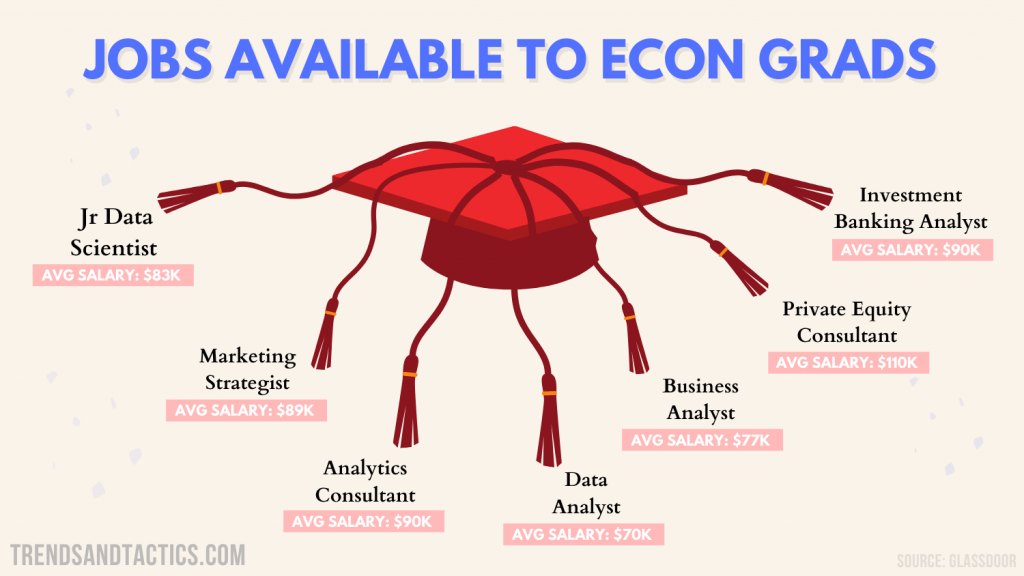Many students entering college find themselves wondering, is an economics degree worthless?
This exact question flashed through my head on a daily basis before committing to earning an economics degree from UNC Chapel Hill a few years ago.
Today, I’ll share whether graduating with an econ degree was worth it, and what opportunities lie ahead for econ majors.
Is an economics degree worth it?
Whether or not an economics degree is worth it comes down to these 2 factors: career landscape and alignment with your life goals.
Career Landscape for Econ Majors

Let’s face it, most people go to college to increase their earning potential with a high paying and secure job.
Therefore, we must consider what jobs can you get with an economics degree to determine whether it’s worth it.
As it turns out, an education in economics is highly valued in the finance, consulting, and investment industries, all of which pay handsomely to help ensure their operations run as effectively as possible.
As a result, there are many amazing jobs with an economics degree.
In addition, knowledge of economics is quite valuable for students who go onto graduate programs in law, business, and even medicine due to the highly analytical and problem solving nature of the curriculum.
Average Salaries of Jobs for Economics Degree Holders:
- Investment banking analyst – $90,227 (Glassdoor)
- Private equity consultant – $109,891 (Glassdoor)
- Business analyst – $80,334 (Glassdoor)
Does it align with your life goals?
Although some people attend college for the sole purpose of gaining better job prospects, there’s another pool of people who are more interested in studying stimulating curriculum and gaining valuable life skills.
Having earned a degree in economics myself, these are the 4 major skills you’ll develop, and it’s up to you to decide how important these are for you both inside and outside of work:
- Analytical Skills – at its core, economics revolves around analyzing financial systems, from individual households to national economies. To accurately measure the impact of financial factors, you will learn to approach situations from an analytical and logical perspective.
- Problem Solving Skills – much of economics curriculum involves determining what’s causing a financial system to change and by how much. Many of these scenarios require students to reason through problems rather than just following a formula.
- Quantitative and Math Skills – since economics is rooted in finance, students will spend plenty of time developing their math and quantitative analysis skills. Having a strong grasp on math is a very helpful life skill when it comes to understanding things like mortgage contracts, budgeting, and personal investments.
- Finance Skills – is an integral part of the study of economics, and so you can expect to level up this skill by the time you graduate. This skillset can help graduates run a healthy household from a financial perspective, because they have familiarity with the inflow and outflow of money.
The Verdict
In my case, I was impressed with the career outlook available to economics majors and also saw great value in the life skills taught by the curriculum.
Therefore, my economics degree was definitely worth it, and has served me well in the corporate world the last 3 years.
Is an economics degree hard?
After graduating with an economics degree myself, I would say the process was pretty challenging since much of the curriculum revolves around math and problem solving.
Although earning an economics degree may be challenging, graduates will have excellent job opportunities and develop beneficial life skills in the process.
As it was famously said, “anything worth doing is going to be difficult.”
In addition, once you get past the initial learning curve of macroeconomics and microeconomics theories, many of the later lessons build on themselves pretty quickly.
Whiteboarding econ problems was my favorite way to learn new concepts. I highly recommend giving that approach a go when you feel stuck.
What can you do with an economics degree?
After graduating with an economics degree, you’ll find a lot of doors opening up.
Many graduates are surprised to discover their skillset is employable across well beyond finance industries due to the development of problem solving and analytical skills.
Here are 6 great ways to use your economic degree.
1. Banking, Finance, Investing Roles
This will be the most common route taken by economics majors after graduation, because the skills transfer so effectively into the world of finance.
In my graduating class, most of my classmates went on to work at the top accounting firms, banks, and local investment and private equity firms.
Many of these roles can pull six figures right out of school, although they’ll likely require longer hours than traditional jobs.
2. Data Analyst and Data Science
Living in the digital age, the need for data analysis and machine learning is only going to grow.
Data analytics positions typically analyze data sets for business insights and then share those takeaways with stakeholders and business leaders to improve business operations.
Data science takes things a step further and involves building forecasting and prediction models using machine learning algorithms.
According to the Bureau of Labor Statistics, data analytics based jobs are expected to grow 16% over the next 10 years, far above the average career.
3. Actuarial Roles
Actuary’s are highly math based careers that primarily help assess financial risks and costs in the insurance industry. It’s a popular career choice among college students given the average actuary earns over six figures.
Econ graduates find themselves well equipped for this career after graduation.
4. Entrepreneurship
All successful entrepreneurs are problem solvers. Unlike most careers, entrepreneurship doesn’t come with a roadmap. Instead, entrepreneurs tackle real world problems with unique and creative solutions.
Economics majors will be no stranger to challenging real world problems, which means they will have tons of practice building up some of the most crucial skills for entrepreneurship.
5. General Business (Management, Sales, & Marketing)
Most business roles boil down to people skills, problem solving skills, and analytical skills. Econ majors will spend years delving deep into real world business situations and solving analytical problems.
After graduating with an economics degree, I went into marketing and noticed right away how beneficial it was to have on statistics and analysis fundamentals already.
6. Government Policy Roles
Individuals interested in public policy and government positions pursue economics to learn about the fundamentals of financial factors that influence national economies.
Having a clear view of macroeconomics and how money drives economies is critical for these career paths.
John-Paul Cody has been an avid online seller for years, across platforms including eBay, Mercari, Craigslist, and more. He has a Bachelor's Degree in Economics from UNC Chapel Hill, and works in data analytics and marketing.






